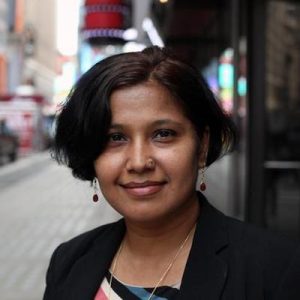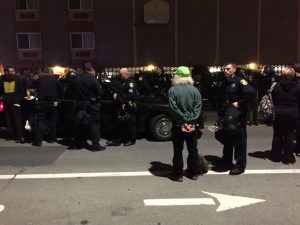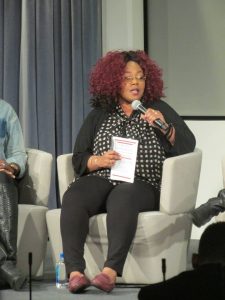
Chaumtoli Huq is the Editor of Law@theMargins. Additional thanks to Editorial Law Intern Val Merlina for her edits on this piece.
Many of you I know who are committed to social justice are processing the United States presidential election results and the pending Trump presidency, and many of you are doing this in different ways: from gathering with friends, getting on social media, jumping into actions and protests, while others of you are planning your safety and survival as part of communities who Trump’s leadership threatens to impact during his First 100 Days in Office.
One thing I learned from lawyering is being present for, and patient with, my clients as they deal with difficult lived experiences, anxieties about their future, or their emotional numbness to the reality of their lives. I try to communicate that their concerns are real and not less important than whatever is going on around them. I take cues from my clients on how and when they want to speak about their experiences, and give space for them to process what they are experiencing without judgment. I assure them that I am with them, and am ready to advocate for them or need be, to step back, as they determine what their needs and demands are. To me, this is called active listening and embodied engagement. This is a valuable form of support and solidarity I can provide. Through this, I can bear witness to their lived experiences.
One of my favorite philosophers, Buddhist Thich Nhat Hanh, [once] said: “When you love someone, the greatest gift you can give someone is your presence. How can you love if you are not there.” This, along with my own Islamic faith practices around community and social justice, reaffirms that our presence is needed and required for us to be of any service to each other, which is discussed eloquently here by Margari Hill of Muslim ARC (Anti-Racism Collaborative) .
As someone who identifies as a progressive, immigrant, woman, mother to multiracial children, Muslim, and other overlapping identities, I come back to the idea of being present for each other, holding space for individuals and communities that need that at this moment in my own effort to make sense of the present socio-political realities. For me, this practice of listening, and holding space, allows for compassion and empathy that will be essential for any social justice path. Thich Nhat Hanh also said, “the present moment is the only moment available to us, and it is the door to all moments.” For those who are wanting to do something and help, one key way you can help is by being present for those in your life: friends, family, clients, neighbors, and children.
As a labor advocate, I know the call to action has been “Don’t Mourn, Organize” or the Mother Jones expression: Don’t Mourn, Fight Like Hell to inspire, and motivate. Today, we acknowledge that mourning, and creating healing spaces is a critical foundation to our social movement work. So, Mourn, and Then Organize.
For those who feel ready to engage on a more community-based approach, I invite you all to connect with local organizations to offer your legal support. Now more than ever, we have to be engaged with community-based organizations that are mobilizing and organizing communities most impacted. Here are some tips from organizer Ash Lee Woodard Henderson of Project South to movement lawyers on how to be present for communities and movements. Bill Quigley gives this advice to lawyers on how to offer your legal support.
I am hopeful that even in the electoral space which seems to be closed, there were some victories. The number of women of color in the Senate quadrupled, including the election of progressive candidate Kamala Harris, the second black woman elected to the Senate. We saw the election of the first Indian-American to Congress, Pramila Jayapal. We also saw Ilhan Omar, first Somali American Muslim women, elected as Minnesota state legislator. In an election cycle steeped in xenophobia, Islamophobia, racism and sexism, these wins are hopeful, and encouraging. They show there are still organizing spaces, and opportunities for change.
Outside of the formal electoral organizing and political campaign space, activists vow to continue to organize, and fight policies of the Trump presidency, from Black Lives Matter activists through Vision for Black Lives, immigrant rights activists, and faith activists including Bend the Arc Jewish Action. I am encouraged by the mobilizing that is already underway to ensure that though Trump was elected, we do not have to accept his destructive policies.
I call on all movement lawyers, my friends who have been committed to supporting social movement tirelessly, to come together, and for us to work in tandem across the States to be ready to provide legal support to communities who may be most impacted by Trump’s policies. Thankfully, over the years, because many of us have been committed to supporting community-based organizations, and social justice movements, we have advocates who have built some of the infrastructure for legal support through their work, including those in response to the Black Lives Matter Movement such as Law4BlackLives and Black Movement – Law Project.
We should begin to ready ourselves to both defend communities under attack, to fight hard for the gains we have won for communities we care about and to continue to push forward grassroots organizing communities’ agenda for social justice.
This cannot and should not be done alone, by one organization, or person, and so, we need to gather our collective resources, and make those resources known in our respective communities. I am heartened by ACLU’s principled and just stance to fight any of Trump’s policies that violate our constitutional rights in court. I encourage other public interest legal organizations, especially those that carry a high profile, to follow in this same stance, and make it public. We need to let communities who will be most impacted by Trump’s policies know that there are lawyers who are ready to fight hard at their side. They need to be able to identify – their human rights defenders. Like the iconic green hat of the NLG Legal Observers of their Mass Defense Committee, we need to make ourselves visible.

Outside of the court battles, there is much legal work that we can do in terms of individual representation in immigration proceedings, as we know already that within the first 100 days, Trump will aggressively enforce immigration laws aimed to deport undocumented immigrants, and as part of his platform may require Muslims to register to a database, among many other discriminatory and harmful policies.
Immigration practitioners are often organized as solo practitioners or small-size firms within their own states; here, groups like the American Immigration Lawyers Association can play a key role to organize its members to take on some of these cases pro bono. The National Immigration Project of National Lawyers Guild has been instrumental in advocating for the rights of immigrants, and their work in support of community organizing. The NLG’s model is one that we should lift up, so that as lawyers provide legal representation, we are connecting clients, and communities with ongoing organizing efforts. While defending, we have to keep focused on our goals to build just and equitable communities. NLG has been doing this work with immigrants in detention, including hunger strikers. We can learn from them, and work to build our law and organizing models in fighting back discriminatory Trump policies.
Given the alarming rate of hate crimes against Muslim Americans, we could predict that this will only increase, and these families will be seeking guidance in navigating the legal system. Trump has said that he will require the registration of Muslims, and concerning this matter we require both an organizing and legal strategy. Here, sadly, we do have law and organizing experiences to draw from, as immediately after 9-11, lawyers assisted in the representation of individuals who were required to register under the Special Registration laws.
The election of Trump even after cases of sexual assault were brought up also indicates a electoral sanction of sexual and domestic violence against women. We need to keep this in our minds, as we often tend to focus on issues in the “public sphere” and ignore violence in intimate partner relationships.
We also know that bigotry permeates into every aspect of our social fabric: through micro aggressions, and other acts that make the day-to-day lives of women, LGBTQ, people of color and their families difficult. We should remain attuned and vigilant to the daily, seemingly innocuous, less overt ways in which bigotry will manifest. We need to support communities here, as well, at the level of daily survival. This includes providing support to accessing economic, and other services. In this place, the expertise of legal services providers who have a long tradition of delivering legal services needs to be involved, so that when housing and other benefits are denied, or taken away all together, there are advocates fighting to preserve access. How can our loved ones fight structural racism, violence, and sexism, when they are at risk of evictions, and losing jobs and benefits?
There are many more ways in which we can see the impact of Trump’s policies on marginalized communities, and others will be made known as we gain clarity on his proposals. It may seem daunting to suggest that among lawyers we mobilize our resources, and make them available to communities who would be most impacted by Trump policies, as well as ensuring access to legal resources for community-based organizations that have been supporting social movements, including Standing Rock, environmental justice, economic rights, immigrant rights and racial justice. We are already under resourced, and over extended. But from my now two-decade experience, I believe we have been building up the local infrastructure to provide legal support to communities. No doubt, it is never enough, and we can do more but, we have a base from which to build together. From what we are doing, even if it results in sharing and make resources public, that would be a good support; and one step further, we can organize among ourselves to pinpoint gaps in legal services.
We should begin to collaborate and coordinate our work as best as we can, share strategies so that we are not duplicating efforts when urgency is key, and in this moment of what feels like crisis, to take this opportunity to strengthen our ties, our organizational structures, and to expand our capacity and resources. Now, more than ever, lawyers who believe in justice, fairness and dignity should come together to support people, and communities as they fight back against the unleashing of bigotry. We should do this using a time-tested law and organizing model, and the movement lawyering model. Law@theMargins stands ready to build with anyone who is interested, and will do its part, even what may be considered small acts to organize legal resources for marginalized communities.

I end with some wisdom to lawyers about supporting social justice movements: I heard from Victoria Phillips of the Urban Justice Center at the Perspectives on Black Lives Matter event at the Law@theMargins and CUNY Law Review-organized talk on the eve of election. She said, and I hope my memory remains true to her words:
“Lawyers, stick to your script. Do YOUR job. We can do the organizing. We can tell our stories. You do your job.”
Heeding that call for us movement lawyers to step up in support of social movements, I ask you to join me in doing our jobs, and to work with organizers and communities so that they can tell their stories, fight for justice, and build a movement.





This post is very interesting in Laywer Members. So that is Good. thank you.